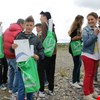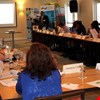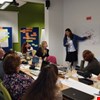


Aquatech India 2014 was held from 6 to 8 May 2014 at Pragati Maidan, New Delhi under the auspices of Amsterdam RAI and Inter Ads-Brooks Exhibitions (India) Pvt. Ltd. India Water Partnership (IWP) supported Aquatech 2014 as a technical contributor and knowledge partner.

On March 31st 2014, the Costa Rican Congress passed the new Water Law. For over a decade the Central American countries have been working on reforming their water legislative and institutional frameworks, and one of the pioneers in this process has been Costa Rica.

A drought monitoring system is being developed in South Asia, in a collaboration between GWP and the International Water Management Institute (IWMI). A first Assessment Report has been released by GWP South Asia and the GWP-WMO Integrated Drought Management Programme (IDMP).

A drought monitoring system is being developed in South Asia, in a collaboration between GWP and the International Water Management Institute (IWMI). A first Assessment Report has been released by GWP South Asia and the GWP-WMO Integrated Drought Management Programme (IDMP).

The 1st Drin Day was celebrated on 17th of May 2014, in numerous locations across the Drin Basin, from Lake Ohrid till the outlet of the Buna/Bojana River on the coast of the Adriatic Sea, in order to mark the willingness for transboundary cooperation aimed at the protection of the shared water resources and its supporting ecosystems.

As part of a two-day Meeting of Regional Partners in Water and Wastewater, GWP Caribbean, the United Nations Environment Programme (UNEP), the Caribbean Regional Coordinating Unit (UNEP-CAR/RCU) and the Global Environment Facility’s Caribbean Regional Fund for Wastewater Management (GEF CReW) partnered to host a special Knowledge Sharing Session on New Tools and Resources for Integrated Water Resources Management (IWRM) in the Caribbean.

Two back-to-back meetings on water management in Central Asia recently took place in Tashkent, Uzbekistan. GWP representatives Natalia Alexeeva and Vadim Sokolov were invited to the regional workshop “Integrated Water Resources Management in Central Asia”, where they presented the IWRM Toolbox and instruments, and gave an overview of the SDG process and the activities of GWP Central Asia and Caucasus.

GWP contributed to three regional training workshops in Ethiopia for Anglophone and Francophone African Least Developed Countries (LDCs) to advance their National Adaptation Plans (NAPs) through the NAP Global Support Programme (GSP).

A sustainable sanitation workshop was held in Ljubljana, Slovenia, on 4-5 April. The event drew parallels among different toolboxes and programmes and enabled networking among experts in the GWP Central and Eastern Europe region.

A sustainable sanitation workshop was held in Ljubljana, Slovenia, on 4-5 April. The event drew parallels among different toolboxes and programmes and enabled networking among experts in the GWP Central and Eastern Europe region.